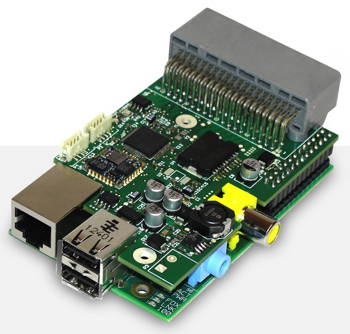The Kickstarter project to back the RIO (Raspberry IO) development attracted the required $15,000 from 93 backers within a month. The card will include a DC/DC power converter for powering the PI from a DC source up to 40V, as well as 13 inputs that can be configured as digital inputs, 0–5V analogue inputs with a 12-bit resolution, or pulse inputs.
Eight digital outputs are provided to drive loads up to 1A. Most of the input pins can also be configured as PWM outputs for driving servos or dimmable lights.
As an option, the card can be fitted with a three-axis accelerometer, three-axis gyroscope, three-axis magnetometer and an algorithm for calculating attitude and heading.
Roboteq will manufacture and sell the RIO card which includes a 32-bit ARM microcontroller for processing and buffering the I/O, and managing the communication with the Raspberry PI’s own Linux-programmed processor. The RIO processor can be configured to perform conversion, capture, filtering and conditioning operations on the I/O, relieving the PI processor of these functions. On the Linux side, RIO comes with drivers and a function library for configuring and accessing the I/O quickly, and exchanging data with the Raspberry.
Roboteq will offer the RIO card as a separate I/O card, or as an assembled and configured embedded robot navigation computer. The basic card will be priced at $75 and the enhanced version at $175.

Low-cost automation: Roboteq's Raspberry PI converter card
When used with Roboteq's motor controllers, the RIO-based computer will open up applications such as unmanned robotic vehicles, as well as more traditional automation and machine controls, and automated test equipment
The board will offer a choice of communication interfaces, including an RS-232/485 serial interface, a TTL serial port for connecting to Arduino and other microcontrollers not equipped with RS-232, and a CAN interface.
The RIO card firmware can be updated in the field to take advantage of new features as they become available.
